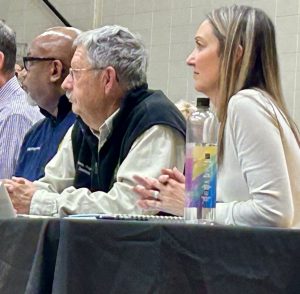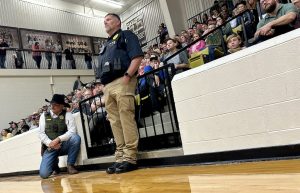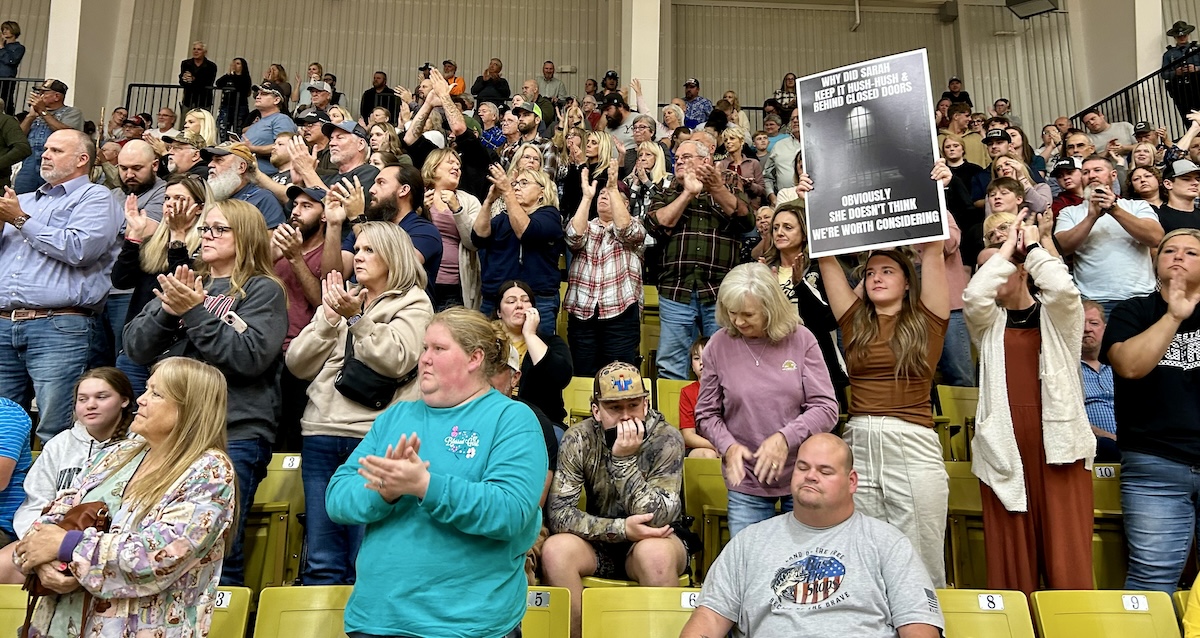The community of Charleston was blindsided with news that a state prison was going to be built near their small town when the governor’s office made an announcement Oct. 31. It turns out state legislators representing the area were kept just as much in the dark.
The final decision to purchase land in Charleston for a new state prison was made in July, but state legislators representing the area were only notified of the purchase and the plans days before closing on the property.
State Sen. Gary Stubblefield, R-Branch, said at a town hall meeting in the Charleston HIgh School gym Thursday (Nov. 7) that he was notified two days before the state closed on property just outside of Charleston in the community of Vesta.
Joe Profiri, senior advisor to the governor, said the governor’s office did not inform legislators earlier because they were concerned the land price would increase and they wanted to be responsible with state funds.
Gov. Sarah Sanders, Arkansas Department of Corrections Secretary Lindsay Wallace, Arkansas Board of Corrections Chairman Benny Magness, and other state and local officials announced Oct. 31 that the state has purchased land in Charleston to build a 3,000 bed prison.
LEGAL QUESTION
“The biggest mistake of this meeting is that it wasn’t held a month ago. Everything was kept a secret because you didn’t want the cost of land to go up? What about the loss to the people here in property values,” Stubblefield said during the town hall. “One of the fundamental principles that make this country is transparency. … They’ve got everything backward.”

Because no public hearings were held prior to the purchase of the land, Stubblefield said he believes the governor’s office and the board of corrections violated state law. He and Franklin County Judge Rickey Bowman asked Jeff Phillips with the county’s prosecuting attorney’s office to file an injunction Friday (Nov. 8) morning against the prison.
Wallace said they had lawyers who had looked at the statute Stubblefield quoted and it does not pertain to state prisons. She said the statute was concerned community-based residential facilities. She also said that it was not yet determined what type of prison would be built in Charleston, though it would not be a death row or maximum security facility.
TRANSPARENCY, LAND ISSUES
Residents raised questions regarding local water supplies, infrastructure, available workforce and more while expressing their concerns and position against the prison.
“We have questions on the transparency and the environmental impact. Local water supplies will be compromised. … And what are the social implications of placing a prison in a small community? This is more than just a place on the state’s map. It’s our home. These concerns are not just abstract, they directly affect the quality of life that we worked to build,” said Rosemary Underwood who lives in Vesta, 2.5 miles from the proposed prison.
Speaking on behalf of Charleston citizens, Underwood said there should be a comprehensive assessment of environmental, economic and social impact before there is a vote to approve the prison.
 Profiri admitted there have been no studies of the land. He said it was chosen primarily because it was more than 60 miles from other state prisons and because of the size of the area’s workforce. He said the state would provide whatever infrastructure needs the prison and its construction would have. He also said the prison would have its own water and sewer plants, although he did not address where the prison would obtain water.
Profiri admitted there have been no studies of the land. He said it was chosen primarily because it was more than 60 miles from other state prisons and because of the size of the area’s workforce. He said the state would provide whatever infrastructure needs the prison and its construction would have. He also said the prison would have its own water and sewer plants, although he did not address where the prison would obtain water.
BOARD VOTE
Magness said there would be a vote on the prison during a Friday morning meeting of the Board of Corrections (BOC). He refused when asked to postpone the vote, but explained later during media questions that the vote is only to accept the land purchased by the state for the purpose of building a prison. He said it does not mean the board is approving prison construction.
“I came here to answer any questions. The problem is I’ve been through this process three or four times. And I guess I’ve seen the same reaction three or four times. And I’ve seen things then later,” Magness said, adding that communities initially oppose a prison but later accept it when they see the economic benefits.
BOC member Lee Watson, who attended the town hall, said he had no idea whether the vote would pass Friday.
Marilyn Moore of Charleston told the 1,800 or more attendees at the town hall meeting who filled the gym to capacity, that it didn’t matter what the BOC vote was or what happened with the courts, they still had the ability to fight. She said she is starting a fundraising campaign to hire a lawyer to help the community fight the prison.
“I will go as far as I can with all of you to try to hold up this process as long as we can,” Moore said.
OTHER COMMUNITY CONCERNS
Frank Hug, owner of Charleston-based Hug Chevrolet and a community business leader, told Talk Business & Politics before the town hall that “community members are concerned with the secrecy surrounding the announcement.” He said there may be people in the region who support the prison, but he has not heard from anyone who wants it.
“Many of the people in the local communities around the (prison) site are concerned that we don’t have the infrastructure to handle an influx of a large population, including housing and sewer,” Hugg said.
Other concerns listed by Hugg include the ability of local school districts to handle an influx of students resulting from a prison that will have 800 workers, lack of emergency services with area municipalities to support a larger population and help provide security around a prison, and the ability of the state to hire enough people in an area with a low unemployment rate. The county’s September jobless rate was 2.7%, below 3.2% rate in the Fort Smith metro and below the state’s September jobless rate of 3.3%.
“Business people, the people I talk to, are worried that as hard as it is to find employees now, it will be even harder to find workers if the prison is built,” Hugg said.
Hugg also questioned how the state plans to hire 800 people to staff the prison when the Arkansas Department of Corrections struggles to staff existing facilities. The state’s corrections’ job vacancy rate as of Thursday was 32.07%, according to the department.
A lack of staffing resulted in controversy and legal action in late 2023 between Gov. Sanders and the Arkansas Board of Corrections. In a Nov. 17, 2023, press conference, Sanders blasted the BOC for rejecting most of a request to provide more than 600 additional beds in the prison system. BOC members at the time made it clear that the prison system lacked the staff to responsibly add more beds.
Talk Business & Politics editor Michael Tilley contributed to this report.
Related
(Except for the headline, this story has not been edited by PostX News and is published from a syndicated feed.)

